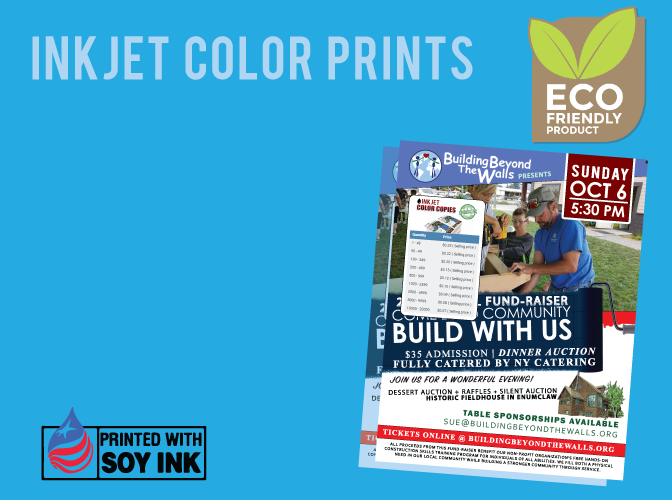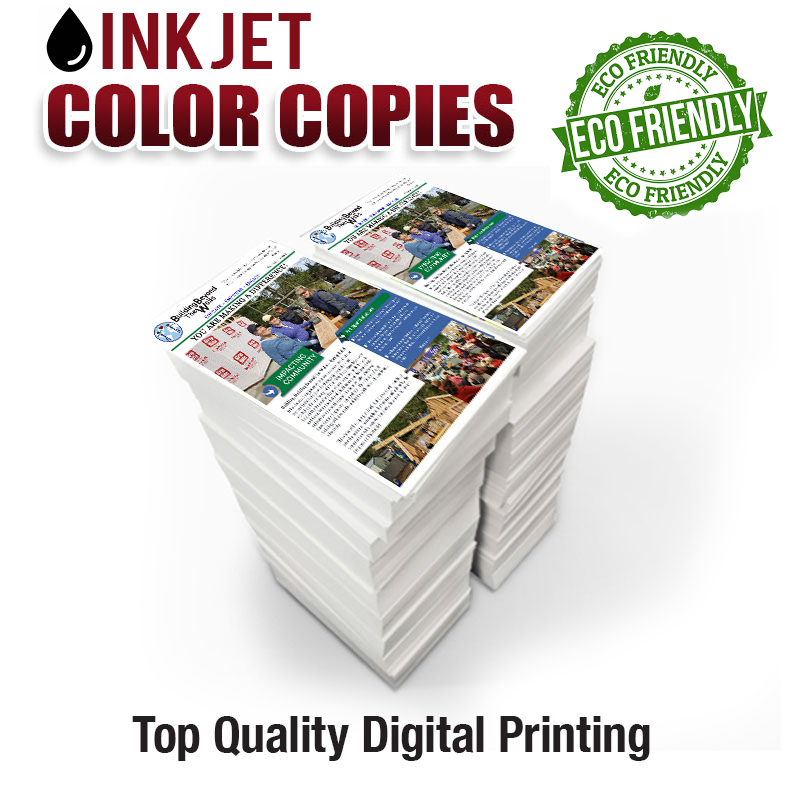Description
Standard Color INKJET (layers environmentally friendly ink soaking into paper)
This INKJET product uses soy and other vegetable-based inks which are less harmful to the environment than their petroleum-based counterparts. Soy and vegetable products are used in ink for their oils, which act as the vehicle for the ink pigments. There are several types of vegetable-based printing inks, including linseed (Flax), tung (Chinawood), castor, canola, and safflower. Soy is popular because it is a very stable material that exhibits excellent “wetting” properties which enhance its ability to carry solid pigments. Most manufacturers of soy and vegetable based inks today actually “blend” ingredients, much in the way a winemaker will blend grapes, in order to take advantage of the unique characteristics of each oil.
Soy and vegetable based inks are widely recognized as the environmentally friendly choice. But an ink’s ingredients are only part of the story when measuring its environmental impact. Ink, like any other product manufactured by humans, impacts our planet before, during, and after it’s manufactured.
Some portion of raw materials are emitted into the atmosphere during both the manufacture and printing of ink. The heightened environmental consciousness of recent years has resulted in a campaign to reduce VOC’s (Volatile Organic Compounds) in inks. PRINT WA uses soy and vegetable-based inks that have evolved to VOC levels of zero percent, down from conventional commercial sheetfed inks that measure VOC levels of 25-35 percent. As with any new or modified product, there were early failures and Soy-based inks came under attack in the pressroom because drying and adhesion suffered. But gradually, high performance inks have emerged, with vastly reduced VOC’s. Printers, print buyers and environmentalists have learned that low VOC inks can be produced from a wide variety of vegetable oils, not just soy, and we at PRINT WA adhere to our standard of using the lowest VOC rated inks available. And, as part of our Green Business Certification, we at PRINT WA adhere to practices that minimize the release Volatile Organic Compounds from inks into the atmosphere.
Almost as important as the manufacture and use of vegetable inks is the recycle and reuse programs implemented by the printer. Anything a printer does to steer materials from landfills is of environmental benefit. In this area, PRINT WA abides by the following criteria:
- We tightly control our inventory and scheduling practices, ordering only the quantities of ink we need.
- We recycle unused inks.
- We specify “low VOC” or “vegetable based inks” rather than asking only for soy. Some non-soy vegetable inks are actually lower in VOC than soy.
![Print WA [ Washington Premier Print Company ]](https://www.printwa.com/wp-content/uploads/2019/08/printwa_logo-sm-1-e1567651603398.png)
















Reviews
There are no reviews yet.